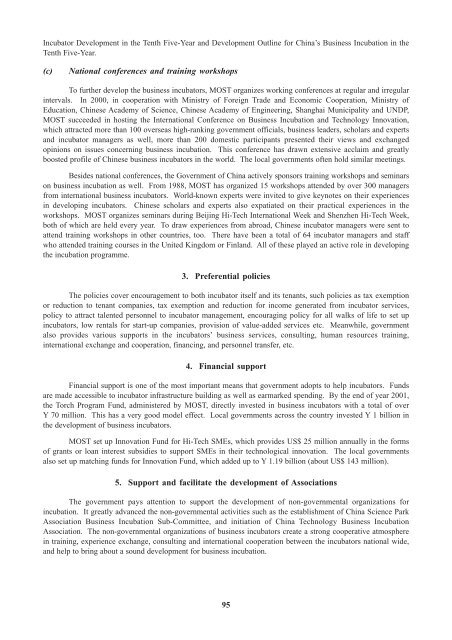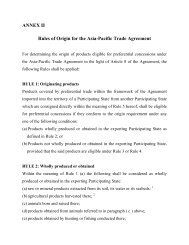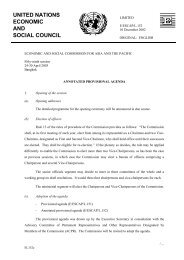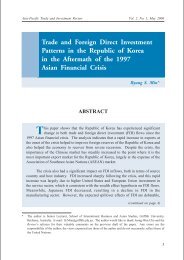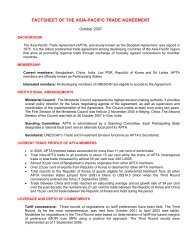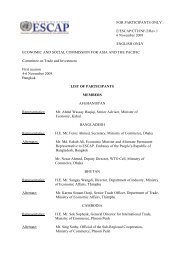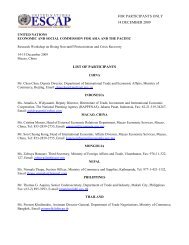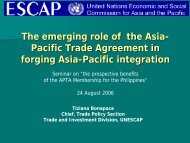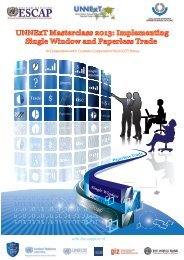iii. promoting business and technology incubation for ... - Escap
iii. promoting business and technology incubation for ... - Escap
iii. promoting business and technology incubation for ... - Escap
Create successful ePaper yourself
Turn your PDF publications into a flip-book with our unique Google optimized e-Paper software.
Incubator Development in the Tenth Five-Year <strong>and</strong> Development Outline <strong>for</strong> China’s Business Incubation in the<br />
Tenth Five-Year.<br />
(c)<br />
National conferences <strong>and</strong> training workshops<br />
To further develop the <strong>business</strong> incubators, MOST organizes working conferences at regular <strong>and</strong> irregular<br />
intervals. In 2000, in cooperation with Ministry of Foreign Trade <strong>and</strong> Economic Cooperation, Ministry of<br />
Education, Chinese Academy of Science, Chinese Academy of Engineering, Shanghai Municipality <strong>and</strong> UNDP,<br />
MOST succeeded in hosting the International Conference on Business Incubation <strong>and</strong> Technology Innovation,<br />
which attracted more than 100 overseas high-ranking government officials, <strong>business</strong> leaders, scholars <strong>and</strong> experts<br />
<strong>and</strong> incubator managers as well, more than 200 domestic participants presented their views <strong>and</strong> exchanged<br />
opinions on issues concerning <strong>business</strong> <strong>incubation</strong>. This conference has drawn extensive acclaim <strong>and</strong> greatly<br />
boosted profile of Chinese <strong>business</strong> incubators in the world. The local governments often hold similar meetings.<br />
Besides national conferences, the Government of China actively sponsors training workshops <strong>and</strong> seminars<br />
on <strong>business</strong> <strong>incubation</strong> as well. From 1988, MOST has organized 15 workshops attended by over 300 managers<br />
from international <strong>business</strong> incubators. World-known experts were invited to give keynotes on their experiences<br />
in developing incubators. Chinese scholars <strong>and</strong> experts also expatiated on their practical experiences in the<br />
workshops. MOST organizes seminars during Beijing Hi-Tech International Week <strong>and</strong> Shenzhen Hi-Tech Week,<br />
both of which are held every year. To draw experiences from abroad, Chinese incubator managers were sent to<br />
attend training workshops in other countries, too. There have been a total of 64 incubator managers <strong>and</strong> staff<br />
who attended training courses in the United Kingdom or Finl<strong>and</strong>. All of these played an active role in developing<br />
the <strong>incubation</strong> programme.<br />
3. Preferential policies<br />
The policies cover encouragement to both incubator itself <strong>and</strong> its tenants, such policies as tax exemption<br />
or reduction to tenant companies, tax exemption <strong>and</strong> reduction <strong>for</strong> income generated from incubator services,<br />
policy to attract talented personnel to incubator management, encouraging policy <strong>for</strong> all walks of life to set up<br />
incubators, low rentals <strong>for</strong> start-up companies, provision of value-added services etc. Meanwhile, government<br />
also provides various supports in the incubators’ <strong>business</strong> services, consulting, human resources training,<br />
international exchange <strong>and</strong> cooperation, financing, <strong>and</strong> personnel transfer, etc.<br />
4. Financial support<br />
Financial support is one of the most important means that government adopts to help incubators. Funds<br />
are made accessible to incubator infrastructure building as well as earmarked spending. By the end of year 2001,<br />
the Torch Program Fund, administered by MOST, directly invested in <strong>business</strong> incubators with a total of over<br />
Y 70 million. This has a very good model effect. Local governments across the country invested Y 1 billion in<br />
the development of <strong>business</strong> incubators.<br />
MOST set up Innovation Fund <strong>for</strong> Hi-Tech SMEs, which provides US$ 25 million annually in the <strong>for</strong>ms<br />
of grants or loan interest subsidies to support SMEs in their technological innovation. The local governments<br />
also set up matching funds <strong>for</strong> Innovation Fund, which added up to Y 1.19 billion (about US$ 143 million).<br />
5. Support <strong>and</strong> facilitate the development of Associations<br />
The government pays attention to support the development of non-governmental organizations <strong>for</strong><br />
<strong>incubation</strong>. It greatly advanced the non-governmental activities such as the establishment of China Science Park<br />
Association Business Incubation Sub-Committee, <strong>and</strong> initiation of China Technology Business Incubation<br />
Association. The non-governmental organizations of <strong>business</strong> incubators create a strong cooperative atmosphere<br />
in training, experience exchange, consulting <strong>and</strong> international cooperation between the incubators national wide,<br />
<strong>and</strong> help to bring about a sound development <strong>for</strong> <strong>business</strong> <strong>incubation</strong>.<br />
95


